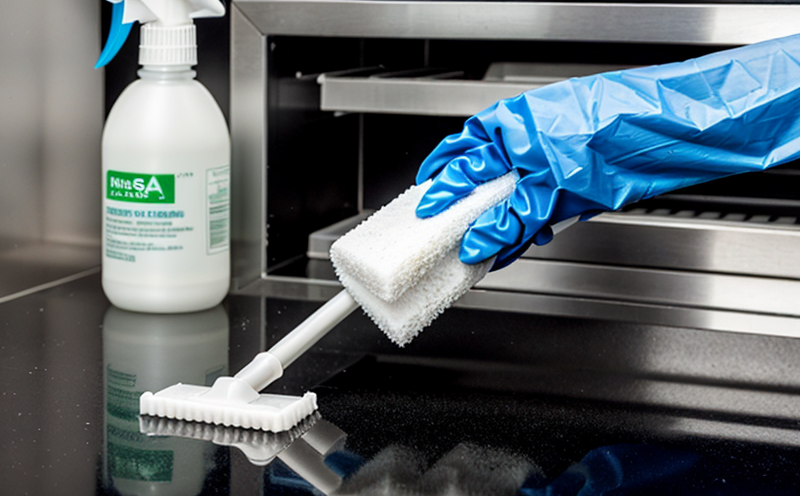DIN EN 1650 Fungicidal Testing of Plastics for Hygiene Surfaces
The DIN EN 1650 standard is a crucial guideline for manufacturers and quality managers aiming to ensure the fungicidal efficacy of plastics used in hygiene surfaces. This testing ensures that materials meet stringent requirements, thereby protecting public health by preventing the spread of fungal contaminants.
Understanding the importance of this test requires insight into how fungi can pose significant risks if left unchecked on hygienic surfaces. Fungi like mold and mildew can thrive in moist environments, leading to potential contamination issues that could compromise hygiene standards and cause discomfort or illness among users. Therefore, ensuring plastics used in these applications are effective against fungal growth is paramount.
The DIN EN 1650 standard specifies the procedure for determining the fungicidal efficacy of plastics intended for use as surfaces in environments where hygiene is critical. This includes but is not limited to medical facilities, food processing plants, and healthcare settings. The test method involves exposing plastic specimens to a standardized fungal inoculum under controlled conditions designed to mimic real-world usage scenarios.
The testing process typically begins with careful preparation of the plastic samples according to specified dimensions and tolerances outlined in the standard. Specimens are then exposed to a suspension containing spores or hyphae from selected test fungi, followed by incubation at appropriate temperature and humidity levels conducive to fungal growth. After an agreed-upon period (usually 28 days), the surviving fungal colonies on each sample are quantified using established metrics.
Results from DIN EN 1650 testing provide critical data regarding the fungicidal properties of plastic materials, enabling manufacturers to make informed decisions about material selection and processing methods. Compliance with this standard ensures that products meet stringent hygienic standards, enhancing trust in the quality and safety of hygiene surfaces.
- Ensures compliance with international hygiene standards
- Protects public health by preventing fungal contamination
- Enhances user confidence through rigorous testing protocols
- Aids in material selection for high-hygiene applications
Why Choose This Test
- Ensures compliance with international hygiene standards
- Protects public health by preventing fungal contamination
- Enhances user confidence through rigorous testing protocols
- Aids in material selection for high-hygiene applications
Selecting DIN EN 1650 fungicidal testing offers numerous advantages. Firstly, it ensures that your products meet the highest international hygiene standards, which is essential for gaining market access and maintaining a positive reputation. Secondly, this test helps protect public health by eliminating potential fungal contamination risks associated with non-compliant materials.
Moreover, adopting DIN EN 1650 testing can significantly enhance user confidence in your products, fostering trust among consumers and stakeholders. By demonstrating commitment to quality and safety through rigorous testing procedures, you position yourself as a leader in the industry. Finally, choosing this test supports informed material selection for high-hygiene applications, ensuring that only the most effective and reliable materials are used.
International Acceptance and Recognition
DIN EN 1650 is recognized globally as a leading standard for assessing the fungicidal efficacy of plastics intended for use in hygiene surfaces. Its widespread adoption reflects its reliability and effectiveness in ensuring hygienic conditions across various sectors.
Many countries have adopted DIN EN 1650 due to its robust methodology, which has been validated through extensive research and practical application. International organizations such as the World Health Organization (WHO) recommend compliance with this standard for establishing hygiene benchmarks.
The acceptance of DIN EN 1650 extends beyond national borders, making it a preferred choice for manufacturers aiming to export their products internationally. By adhering to this standard, companies can ensure that their materials meet the stringent requirements set by different regulatory bodies worldwide.
Use Cases and Application Examples
DIN EN 1650 fungicidal testing finds extensive use in various industries where hygiene is paramount. For instance, medical device manufacturers rely on this test to verify the safety of materials used in disposable trays and other equipment that comes into direct contact with patients.
In the food processing industry, producers utilize DIN EN 1650 testing to confirm that packaging materials maintain hygiene standards during prolonged storage periods. Similarly, furniture manufacturers benefit from this test when developing products for healthcare settings or high-traffic areas where cleanliness is crucial.
Additionally, laboratories and research institutions employ DIN EN 1650 testing in their quality assurance processes, ensuring that the plastic components used in experimental setups do not contribute to cross-contamination. This comprehensive approach guarantees consistent hygiene levels across all stages of product development and usage.





